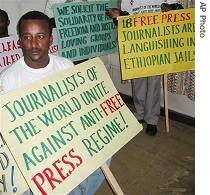2006年VOA标准英语-Eritrea, Ethiopia Ranked Among Worst Press Viol(在线收听)
By Cathy Majtenyi
Nairobi
24 October 2006
 Ethiopian journalists demand release of more than a dozen jailed colleagues during a press conference in Nairobi, May 2, 2006 |
||
----
To come up with its index, the Paris-based organization looks at such factors as censorship, threats, intimidation or physical reprisals levied against journalists as they gather and report information.
Out of the 168 countries surveyed, the Horn of Africa nation of Eritrea ranked 166th, doing slightly better than Turkmenistan and North Korea.
The head of Reporters Without Borders' Africa desk, Leonard Vincent, tells VOA that in 2001, Eritrean President Isaias Afwerki suspended the private press in his country and launched a security operation to arrest influential members of the private press who appealed for democratic reforms in the young country.
"There are more than 100 political prisoners somewhere in the jails of the country," said Leonard Vincent. "At least 13 journalists are in jail. They have no access to their lawyers or to their families. So this is a very concerning situation."
Several years ago, a Voice of America reporter was arrested and jailed in Eritrea because of a report he filed for VOA. He has since been released.
Eritrean authorities could not be reached for comment.
Slightly behind Eritrea is its neighbor, Ethiopia, ranked 160th out of the 168 countries surveyed.
The organization says this is primarily because of last year's crackdown by the government against journalists, opposition supporters, activists, and others contesting the results of the May 2005 elections.
Dozens of journalists were arrested and charged with treason, including five VOA reporters charged in absentia. About 20 journalists still remain behind bars, possibly facing the death penalty because of their reporting.
The head of Ethiopia's Press, Film, License, and Regulation Department, Fantahun Asress, tells VOA that press freedom is a reality in Ethiopia, saying that since 1992, more than 1,100 licenses have been granted to private and government newspapers, broadcasters, and other media.
Fantahun says he thinks it is the private media that is plagued with problems.
"The major ones are: lack of professionalism; weak organizational structure; and the other is the political attitude of journalists," said Fantahun Asress. "Journalists usually report based on their own political grounds."
Reporters Without Borders also expressed concerns about Uganda, which was ranked 36 places lower than the previous index. Vincent explains.
"In Uganda, the situation was really bad during the elections in the beginning of this year, where several foreign correspondents were threatened or expelled, and information was kept under strict control of the government," he said.
Vincent says the governments of Kenya, Burundi, and Rwanda also displayed hostility towards journalists in 2006. Low rankers in other parts of the continent include: Gambia; Somalia; Democratic Republic of Congo; Zimbabwe; and Equatorial Guinea.
But there were some bright spots in Africa. Benin, Namibia, and Mauritius are ranked among the best countries in Africa for press freedom, with Ghana making good progress.
Vincent says in countries such as those, journalist groups are strong and responsible, there is a viable opposition press, and journalists do not have to fear facing systematic intimidation and arrest.